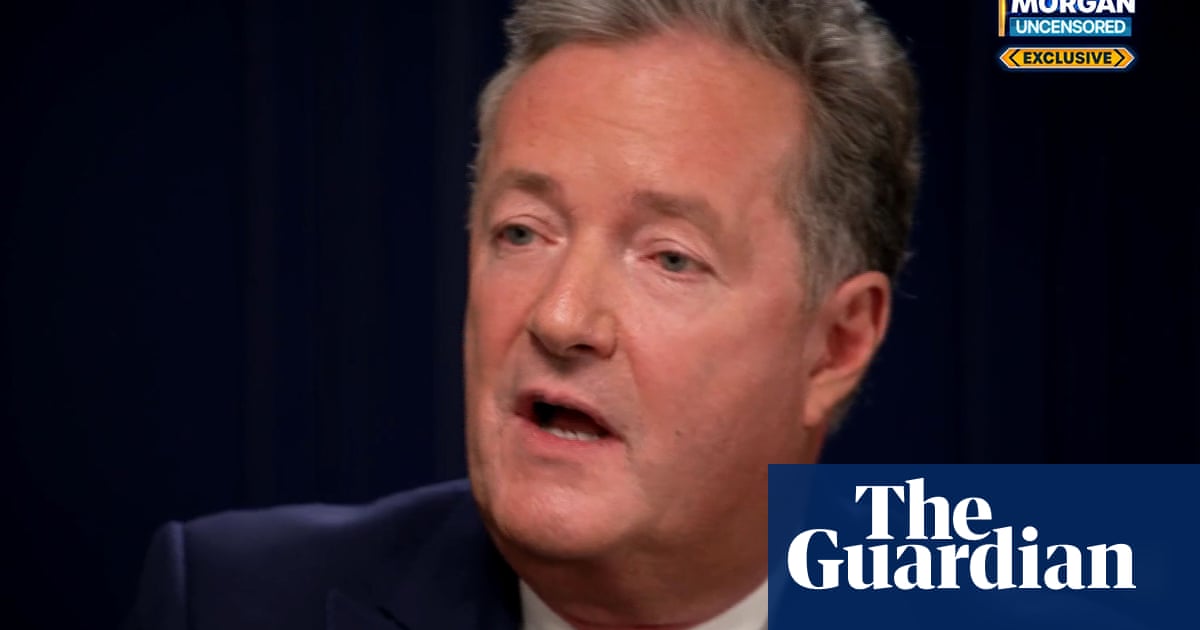The media world is undergoing a “sea change” in which some traditional titles disappear,Piers Morganhas predicted, as he said some YouTube channels would soon have as much power as traditional network television.
The presenter and former newspaper editor, who is holding funding talks to expand hisYouTubebusiness, predicted more established media figures would soon follow him to the increasingly influential streaming service as audience habits continue to shift.
“It’ll be like when vinyl music moves to digital,” he said. “People thought it would take a long time. Actually, it was like that.
“Certain newspapers just won’t exist in the UK. Which newspapers will still have a print edition in 10 years’ time? Look at what young people do. I don’t see anyone under 45 buying a print newspaper. So there’s a ticking clock. If people don’t listen to that ticking clock beating loudly in their ears, they’re going to get a very nasty surprise. This is the wake-up moment.”
Morgan now owns the rights to his YouTube channel, Piers Morgan Uncensored, which hesecured from Rupert Murdoch’s empireafter the expiry of a News UK deal that paid him a reported £50m over three years. After just turning 60, he admits the transition has been a “learning curve”, but he is now an evangelist for YouTube and its combination of flexibility and low costs.
He said his decision to go “full fledged” into the streaming service was driven by his four children. “All of them watch YouTube,” he said. “None of them watch actual television, other than for live sport. Until a year ago, I was trudging into an old-fashioned, structured, 8pm live news show, when in fact there was no need to do that. It was a very expensive way of disseminating something I can do to a global audience, a lot cheaper – but also much faster and much longer.”
While Morgan is a figure who divides opinion, his move into YouTube is part of a wider trend that has seen media figures – particularly on the US political right –forge channels with millions of subscribers. Morgan is aiming to replicate the success of The Daily Wire, a US conservative media company co-founded by the rightwing political commentator Ben Shapiro. Its roster includes the Canadian psychologist Jordan Peterson.
YouTube is becominghugely influential right across the media, with broadcasters such as ITV and Channel 4 now placing some content on it. Podcasters also increasingly stream their shows there. It has led to significant financial muscle. In the first three months of 2025 alone, YouTube’s advertising revenue was $8.9bn (£6.64bn), an increase on the previous year of more than 10%. Meanwhile, revenue at Channel 4 for the whole of 2023 was about £1bn, the latest year available.
Morgan pointed to the US election last year. YouTube said more than 45 million people in the US watched election-related content on polling day. Meanwhile, an average of 42.3 million viewers watched across 18 cable and broadcast networks that evening. While the figures are not directly comparable, Morgan said: “If that doesn’t tell you where the eyeballs are going, I don’t know what will.”
He said some “big, big names” in journalism have been in touch to ask if they could make the switch. “I also think that legacy media companies have to look at people like me and others and think, why are they going off on their own and into this world,” he said. “A lot more people will do what I’m doing. I’m getting a lot of very interesting calls from journalists.”
Morgan is now drawing up plans to attempt something similar to Gary Lineker’s Goalhanger Productions, which has created a series of successful podcasts in the UK. Morgan wants to create channels under the Uncensored brand covering genres like true crime, history and sport. However, he is aiming squarely and apologetically at the US and a global audience, not Britain – whose audience he describes as “pretty well irrelevant” to his plans.
Sign up toFirst Edition
Our morning email breaks down the key stories of the day, telling you what’s happening and why it matters
after newsletter promotion
“You’ve seen what Gary Lineker has done, he’s a good friend of mine, with Goalhanger in the UK, but he would be the first to tell you that the most successful [podcast for Goalhanger] in terms of revenue is The Rest is History, because it’s big in America,” he said. “It’s not the football one with him on it. It’s the history one. Those guys go over to America and do big live shows, and it’s huge over there.
“I hardly ever cover UK news. We didn’t even touch the last election, because my whole prism is through the lens of: ‘Will an American want to watch this? Will somebody in the Middle East want to watch this? Will someone in Australia want to watch this?.’”
Morgan said his expansion plans were in part to lower the reliance on him personally and build something that could stand on its own – a much harder task than building a following around an established figure. He said it was “early days”, but was being bullish with potential investors as the business was already profitable.
“I don’t need the money,” he said. “We’ve got nearly 4 million subscribers … My question to investors is not so much, ‘Give me your money.’ It’s ‘Why should I take your money and what are you going to bring to the party?’”
